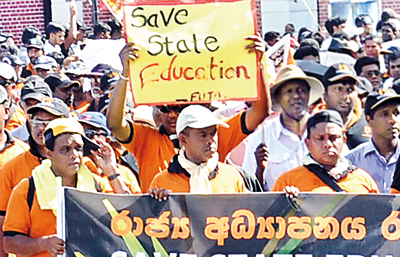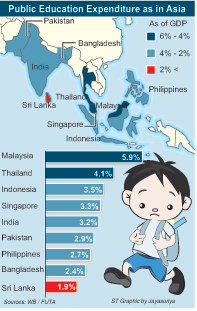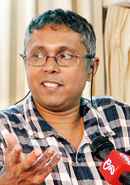Letters to the Editor
View(s):A physician’s wisdom
Contd from last week…
3. What the Patient Taught Me: I was a young consultant physician in 1965. My first appointment was at the Matara General Hospital. One day I was doing the ward round with the assistant doctors, interns, senior house officer, registrar, nurses, attendants, and so on. They were all following me. I went up to an 80-year-old patient and said, “Seeya, dhiva dhaanda” (put out your tongue). He retorted: “Sir, pihiyak hari kathurak hari thiyenawada?” (do you have a pair of scissors or a knife). “Ei, Seeya?” (Why?) I asked in consternation. “Dhivak dhaanne kohomadha, Sir, kapanne nethuwa? Sir, meen pasu kiyanna, ‘Dhiva dhik karanna, nathnam, dhiva pennanna” (Sir, in future say, Show me your tongue, or extend your tongue). That was a lesson in proper usage of the Sinhala language, from a Southern gentleman. I too was born in the South, in the town of Talpe, on the further side of the Bentara River.
4. What the Virus Taught: I learnt the following lesson only very recently, on July 29, 2012, to be exact. I am in my late 70s (the last chapter of my life), and I tell my patients that if they felt even slightly unwell, they should not exert themselves. “Rest until you feel perfectly fit, because more likely than not a virus has entered your system and is causing you to feel this way.” To date, we have no known weapon (antibiotic) to destroy a virus. On the other hand, a bacterial infection can be easily tackled with antibiotics. In our fourth and final chapter in life, our body resistance drops drastically, and the only way to combat a virus invasion is to take adequate rest, nutrition, and painkillers in moderation.
On Friday, July 27, I was feeling unwell. I had a back-ache and felt feverish. Nevertheless, I swam 16 lengths at the SSC swimming pool on Friday 27, and on Saturday I washed my car and mopped my bedroom, etc, and on Sunday the 29th I did my usual five-mile walk, from 4.30 a.m. to 6 a.m. In my youthful days, this was my therapy for chasing away a virus. And indeed it worked. This time, however, the virus overpowered me and taught me a bitter lesson for the rest of my life.
My paper delivery man met me at 4.30 a.m. that Sunday and said, “Sir, adha babali, babali, purudhu walk yanawa wage” (you are bubbling with life today) “Kata waha” (evil mouth), I thought. When I got home, I had my usual cold-water bath, ate breakfast, and started dressing to proceed for work at The Central Hospital.
Lo and behold, I started shivering with high fever, and I felt my tongue being sucked in. I telephoned my son and told him I was dying, and that I would be dead by the time he arrived. I told him to proceed with the last rites without delay, for I had paid for my funeral with Barney Raymond on my 75th birthday. My daughter-in-law and granddaughter were sleeping and I did not want to disturb them. My son arrived five minutes later and forced me to go to The Central ICU. On the way to the hospital, I had to get out of the car several times in order to vomit. I entered the ICU and walked up to the bed. The staff were smiling. I felt much better. I ordered an ECG. The ECG showed that I was absolutely normal.
My temperature had gone over 104 and my blood count had dropped far below normal – typical acute viral invasion effects. I made my own diagnosis, asked for a glass of water, and in half an hour had myself driven home.
That was it. I rested for seven days and now I am back to normal.
This is a lesson for all who read this article: When you enter the last and penultimate chapters in life, never exert yourself if you feel unwell. Get adequate rest until you feel absolutely well.
Good luck!
Dr. W. B. Wijekoon
Doctors should be mindful of their role in society
Doctors in service are much in the news these days. It would do us some good to recall a thought-provoking speech given in April 1988 by Dr. Arjuna Aluvihare, when he was Professor of Surgery at the University of Peradeniya. He was addressing the Kandy Medical Society. Although the speech was intended for medical personnel, it will be of interest to non-medical people as well.
Professor Aluvihare emphasised the human factor, saying a doctor’s primary concern should be to assist and heal patients, regardless of personal or situational issues.
Doctors too have their problems, pecuniary and otherwise. They go through a long and arduous training and should be compensated by way of better salaries. This aspect of the doctors’ demands should be considered in a reasonable and unbiased manner.
For their part, the doctors should not do anything to degrade their honoured place in society. They should not stoop to strike action, and put at risk the patients entrusted to their healing care. Doctors should not be misled by irresponsible trade unionists.
The doctors of the Government Medical Officers’ Association (GMOA) should pursue their protest action in an honourable manner through discussion and dialogue.
The administrators should come down from their ivory towers and make a sincere effort to redress the doctors’ grievances. Poor and rich, labourer and administrator, high and mighty, politician and king – we all at some time or other will need the doctor’s healing hand.
The trouble with us Sri Lankans is that we will not think in terms of the other person’s needs. We are self-centred. This is the main reason for the endless bickering and cycle of action and reaction that causes all the social misery that afflicts us today.
R. M. A. B. Dassanayake, Matale
Education – learning through the crisis
Two repeatedly used words in conversations today are “education” and the acronym “FUTA” (Federation of University Teachers’ Associations). There is clarification, explanation and interpretation of the current educational crisis when people gather with serious intent. The media has kept the debate alive with extensive coverage.

The good thing about the three-month FUTA action is that it is educating the people on education. People are learning that free, quality education from primary to tertiary levels is a fundamental responsibility of the State ; that good university teachers must be employed, retained and provided security of tenure if our universities are to flourish; that a government’s seriousness is measured by the amount of money it allocates for education and the degree of independence it allows educational institutions; and that there are worrying gaps between these primary obligations and existing realities.
Another welcome feature about the FUTA action is island-wide collaboration. In embracing academics of all communities, from North and South, East and West, it has demonstrated that our people can rise above sectarian agendas for a common cause.
Lessons in democracy
But the learning curve is not limited to education only. The issue is becoming a profitable case study on the pros and cons of democratic governance in Sri Lanka. For instance, the public is re-learning that governments are formed by the people and exist for the people; and that an important test of democratic governance is the extent to which governments are accountable to the people and willing to listen to public opinion.
Lessons in solidarity
Increasing numbers are also learning that if the issues raised by FUTA are resolved favourably, education and future generations will benefit. This is why there is growing public endorsement of the FUTA action.
But those who endorse must also empathise. Sustaining an action of this nature is costly. Those directly involved, and their families, have repeatedly come under threat. The public should not only endorse but also condemn these threats and offer moral support.
Those directly involved have foregone their salaries for almost three months. Public endorsement must include finding ways to offer appropriate support with respect to the dignity of the person and the person’s commitment to democracy. Those involved, and their families, continue to endure uncertainty and stress. The public should befriend, encourage and accompany these courageous but vulnerable persons.
Long-term lesson
The FUTA action questions the assumption that politicians know best when it comes to education. This assumption has led to drastic cuts in spending, inappropriate academic and administrative appointments, careless mistakes in educational routine such as assessments at public examinations, an arbitrary educational policy, and the inability of those in authority to engage in self- scrutiny and healthy dialogue.
Such initiatives will likely respond to the anguish of the Tamil plantation community, which has for decades lacked proper schooling facilities, especially in the Sabaragamuwa region. The children of this community have been compelled to study in the Sinhala medium, or in Muslim schools, and as a result are gradually losing their language and cultural identity.
Closure, continuity and change
No organised action on public issues can go on forever. We hope that this particular FUTA action will be successfully brought to completion. The FUTA has repeatedly said they are ready for a compromise through negotiations, as long as there is respect and seriousness regarding the issues raised.
The Government should reciprocate with equal flexibility. If a negotiation is to take place, the Government may contend that the FUTA’s demand for a 20 per cent salary increase and a 6 per cent increase in GDP spending on education cannot be granted immediately. If FUTA accepts this position, it could consider an arrangement whereby these amounts will be increased on a staggered basis to reach a viable level over a period of time. This arrangement will likely receive public approval.
Other FUTA concerns also demand attention and democratic change. They impact on our educational values and services. These concerns include the autonomy of our universities, the empowerment of Faculty Boards and Senate Bodies with competent persons, the undermining of free education, leadership training by the military, and improved facilities and accessible quality education for all.
But the FUTA cannot be expected to work alone for these changes. The sustained collaboration of an informed, civic-minded public is indispensable and will make a significant difference. If this collaboration were to include academics and the wider public from all over the island, the dividends could well bring a bonus far beyond the educational sector. There is every possibility that it could release fresh energy for wider democratic change in the country.
Bishop Duleep de Chickera
Follow @timesonlinelk
comments powered by Disqus



















